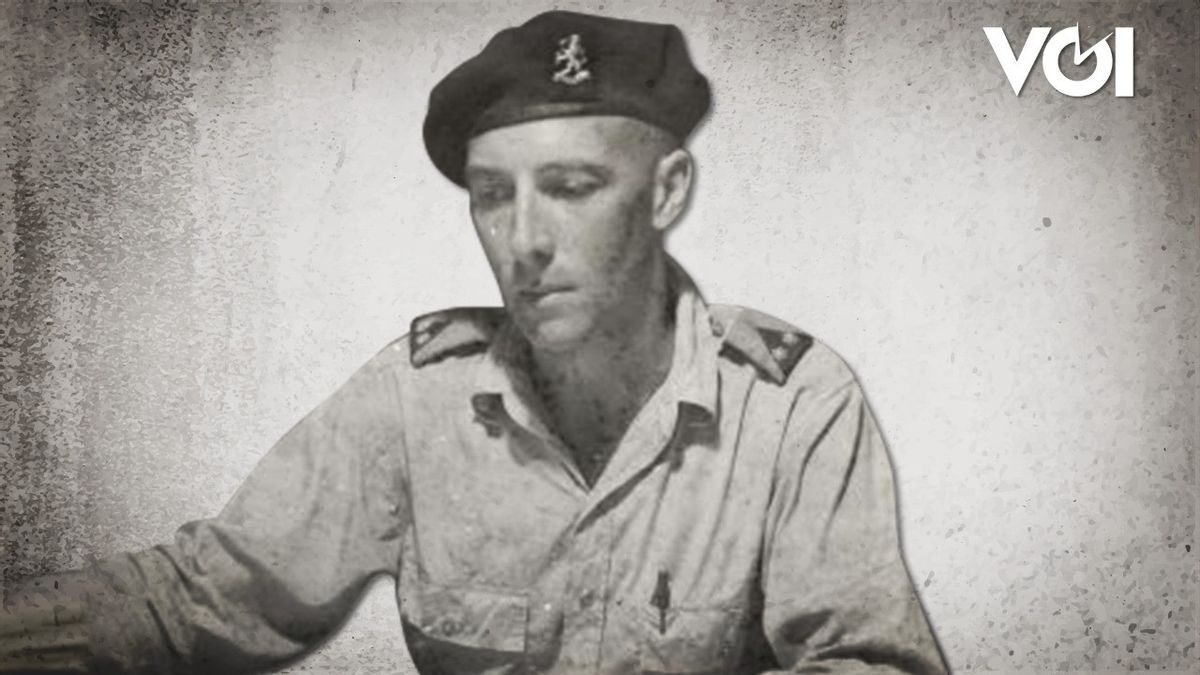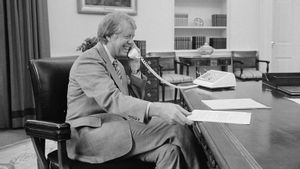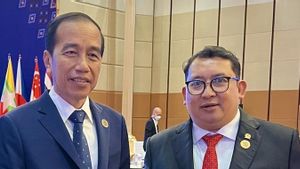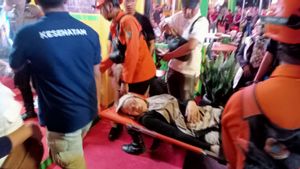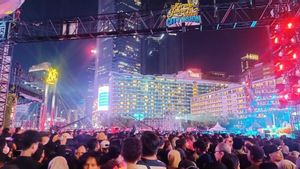JAKARTA - Indonesia is in need of a special skilled armed force. At that time, this country was vulnerable from attack. Brigadier General TNI Ignatius Slamet Riyadi had the idea of forming a special force. Unfortunately, he died before the idea was realized. Idjon Djanbi made it happen. The hands of a Dutchman who formed the Special Forces Command (Kopasus).
Post-independence, Indonesia does not yet have an armed force with special expertise. In fact, at that time, their existence was very much needed to stem various attacks, both from outside and inside the country who tried to wage war with Indonesia.
Moreover, in the 1950s, many domestic movements tried to oppose the central government with a separatist mission, separating themselves from Indonesia to establish their own state. Brigadier General TNI Ignatius Slamet Riyadi had the idea to form a special force that was small in number but effective in carrying out military operations.
Unfortunately, this has not yet been realized, Slamet Riyadi died on the battlefield, in the battle against the separatist movement of the Republic of South Maluku (RMS). Slamet Riyadi was 23 at the time.
In 1951, along with the increasing rebellion by Kartosowiryo's DII / TII in the West Java region, Colonel Infantry Alexander Evert Kawilarang as the Territorial Commander of the Army III / Siliwangi initiated Slamet Riyadi's idea again. The goal is to help efforts to quell the DI / TII rebellion.
The task of persuading Idjon Djanbi
Colonel Aloysius Sugiyanto was then assigned to find people to train the special forces. Sugiyanto's order was to recruit former members of the Koninklijke Nederlands Indische Leger (KNIL). From that search, Sugiyanto found Mochamad Idjon Djanbi.
"I knew at that time that there were no native officers who mastered commando combat techniques like the troops we faced in Ambon. Therefore, the search for trainer candidates was focused on former KNIL soldiers, who were scattered in many places," Sugiyanto, quoted by the November 23 issue of Tempo magazine. 2019.
"In the middle of the search, information appeared that said that in Bandung there was a former Dutch soldier who became Muslim and married a Sundanese woman. His name was Mochamad Idjon Djanbi," he added.
Sugiyanto related how it was not easy to persuade Idjon Djanbi to join the TNI and establish a special forces unit. Despite his experience in fighting in India, Idjon Djanbi no longer wants to be a soldier. When Sugiyanto met, Idjon Djanbi had become a flower farmer in the Lembang area.
"It took two days and two nights to soften his heart. I was staying at his house. I chatted about anything, including the flower issue that I had previously learned on purpose. My efforts were not in vain. Finally Djanbi relented and was willing to participate in training participants in the military intelligence course. the second wave was in Cilendek, Bogor. Djanbi taught paracomando material to mountain-forest warfare, new knowledge for TNI soldiers at that time, "said Sugiyanto.
Idjon Djanbi is an influential figure and has contributed to the red beret soldiers. He is a person who hones the mentally and physically of the selected TNI AD members to be trained to become tough soldiers who can move in small, impromptu, and covert units.
Good soldiersQuoted from the book Kopassus: Inside Indonesia's Special Forces by Ken Conboy, Idjon Djanbi, the founder of special forces, was born in Boskoop Village, Zuid Holland Province on May 13, 1914. He was born with the name Rokus Barendregt Visser.
The outbreak of World War II in 1939 made him join the Dutch army. He fought with Germany at the age of 25. When he was in the Dutch army, Idjon Djanbi was once assigned to be the driver of Queen Wilhelmina.
One year as a driver for the Queen of the Netherlands, he joined the Second Dutch Troop to fight in Operation Market Garden, a battle between allied forces and Nazi German troops. Idjon entered the Airborne Division and was assigned to various concentrations of German troops. Idjon also had time as an amphibious troop who fought in Walcheren, the southern part of the Netherlands.

[/ read_more]
Idjon Djanbi gained combat skills when he was trained at the Achnacarry Commando Basic Training in Scotland. The training was conducted on a cold and uninhabited beach. During the training, Idjon Djanbi acquired various combat skills, such as killing without weapons, killing bodyguards, stealth shooting, hand-to-hand fighting, to killing without firearms.
After training in Scotland, Idjon Djanbi was given a 'vet glider' (green beret). Meanwhile, the red beret was obtained by Idjon Djanbi when he received education from the British Special Air Service (SAS). In addition, Idjon Djanbi also has a PPL-I and PPL-II pilot license and a forest battle license.
With a myriad of skills, Idjon Djanbi was sent by the Dutch to fight in Indonesia. His job at that time was to beat back the Japanese army. At that time, even though Japan had withdrawn from Indonesia after the defeat in World War II, the Dutch continued to send troops because of the opportunity to return to making Indonesia, which had been proclaimed a Dutch colony.
Idjon Djanbi came to Indonesia and briefly trained special forces for the Netherlands, at the School Opleiding Parachutisten (School of Parachutists) in 1946, in the middle of the army headquarters in what was then still Dutch rule: West Papua. At that time military aggression against Indonesia had not yet occurred.
Return to NusantaraIdjon Djanbi returned to Europe to meet his family and his wife, a British woman whom he married during world war. Already in love with Indonesia, Idjon Djanbi had invited his wife to move and settle in Indonesia.
However, the wife refused. There was a divorce between the two. In 1947, Idjon Djanbi returned to Indonesia. This time he is no longer heading to West Papua, because the military school he leads has already been moved to Cimahi, Bandung.
Shortly after his career in West Java, Idjon Djanbi was promoted to captain with the position of Head Coach. During the period during the military aggression from 1947 to 1949, the school he led produced many paratroopers in combat.
After the Dutch military aggression in Indonesia, Idjon Djanbi chose to stay in Indonesia as a civilian. He officially left the military and changed his profession as a flower farmer in Lembang, West Java. His decision to stay in enemy territory - where he had fought - changed Idjon Djanbi's life a lot.
As well as converting himself, Idjon Djanbi also married a Sundanese woman named Suyatni. Since then Rokus Bernardus Visser changed his name to Mochammad Idjon Djanbi. Two years later, in 1951, to be precise, Idjon Djanbi's house was visited by intelligence soldiers, who was none other than Aloysius Sugiyanto.
Sugiyanto asked Idjon Djanbi to help the TNI to become a command trainer in the CIC II (Combat Intelligence Course) education in Cilandak, Bogor. Although he had refused the offer, in the end Idjon Djanbi also wanted to join as a trainer at CIC II with civil status.
The intention to form special forces within the Army was getting bigger. April 1, 1952, upon the decision of the Minister of Defense at that time, Sri Sultan Hamengkubuwono IX, Idjon Djanbi was appointed as Major Infantry TNI with NRP 17665.
Idjon Djanbi is in charge of training cadres of officers and non-commissioned officers to form special forces. On April 16, 1952, a special force was formed for the Army Territory Command III / Siliwangi, abbreviated as Kesko III. The troops were under the command of Infantry Major Idjon Djanbi. This date has been celebrated as the anniversary of Kopassus.

[/ read_more]
One year later, the control of Kesko III was taken directly under the Army Headquarters. The name was changed to the Army Command Unit. On July 25, 1955, the command led by Infantry Major Idjon Djanbi again changed its name to the Army Command Regiment (RPKAD).
Major Idjon Djanbi's progress in producing the special forces was not always smooth. Many parties asked to be replaced or reduced their role in training special forces. The reason was that these parties were concerned that Idjon Djanbi - who in fact was a former Dutch soldier - was a spy for the Dutch in the army.
Finally, a number of military leaders agreed to replace Major Idjon Djanbi with Major RE Djaelani from the Siliwangi Division in 1956. Meanwhile, Idjon Djanbi was offered a new position far from being a troop training business, namely becoming the Education Staff Coordinator at the Education and Training Inspectorate (Kobangdiklat).
However, Idjon Djanbi chose to apply for retirement. At the end of 1957, Idjon Djanbi officially retired and was given the position of head of a plantation in a foreign-owned plantation that had been nationalized. Idjon Djanbi also runs a business in the tourism sector in Yogyakarta.
In 1977, Idjon Djanbi suffered from appendicitis and had to undergo surgery. Two weeks after the appendectomy, Idjon Djanbi died at the Panti Rapih Hospital on April 1, 1977. Idjon Djanbi was buried at the Yogyakarta TPU. There was no special funeral ceremony or salvo to honor the death of one of the founding fathers of Kopassus.

[/ read_more]
The English, Chinese, Japanese, Arabic, and French versions are automatically generated by the AI. So there may still be inaccuracies in translating, please always see Indonesian as our main language. (system supported by DigitalSiber.id)
